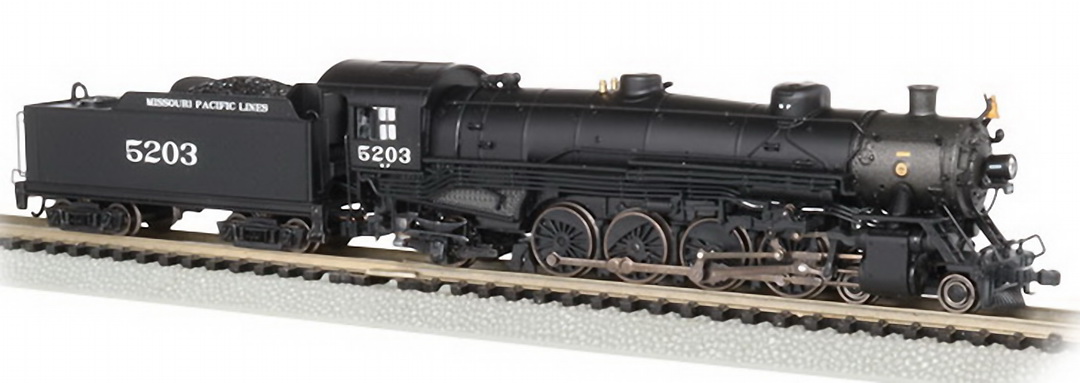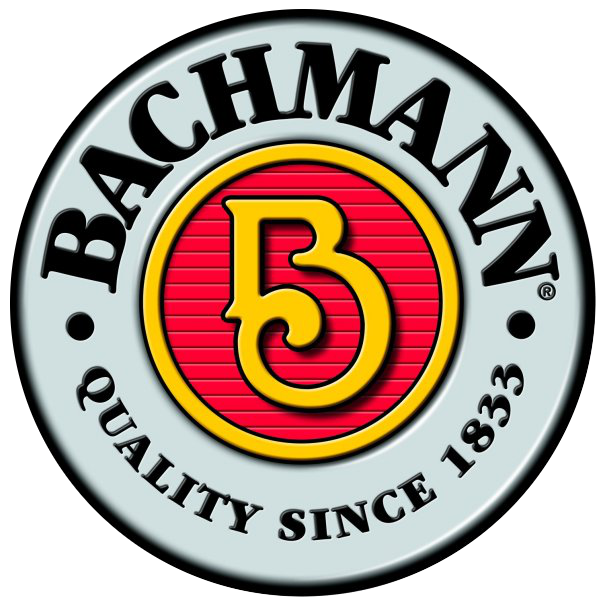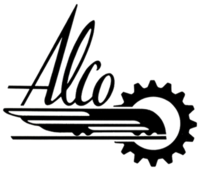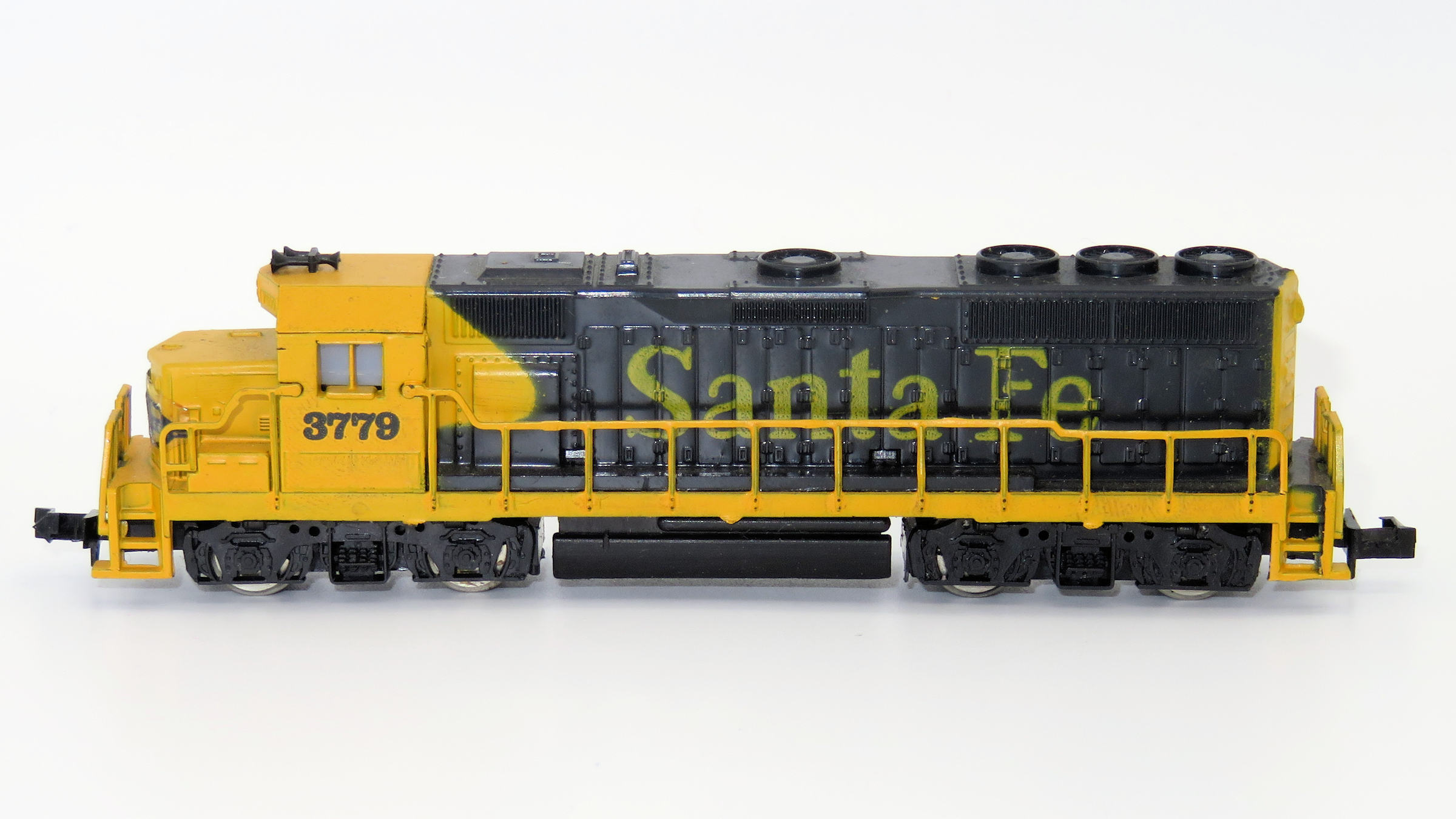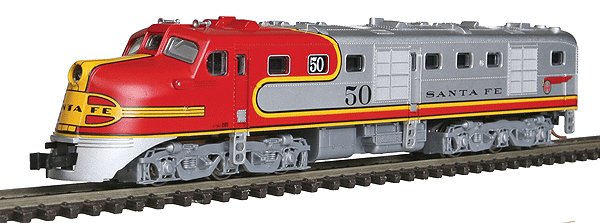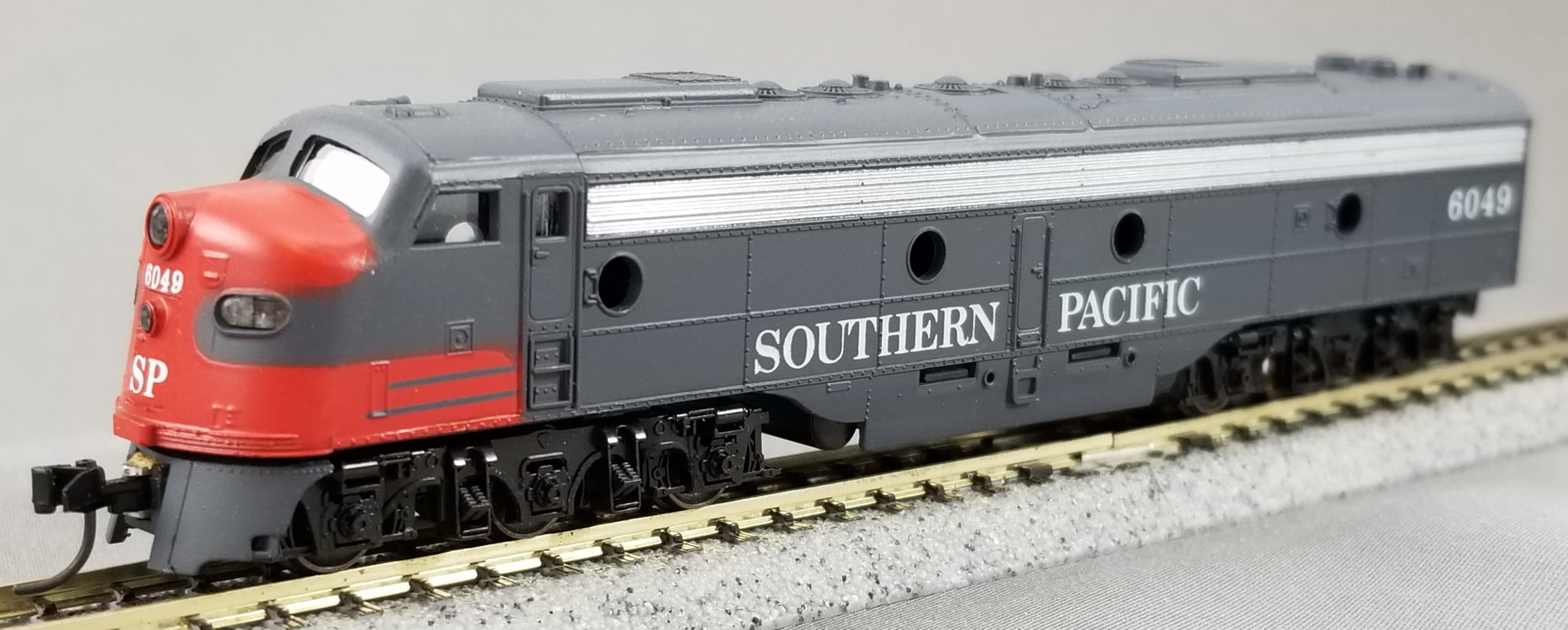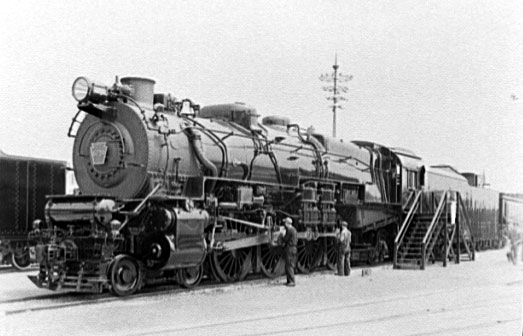Specific Item Information: Bachmann is delighted to offer this N scale 4-8-2 Light Mountain equipped with an Econami™ SoundTraxx® steam package. Factory-set for 4-8-2 realism, the steam package offers a choice of 16 whistles, multiple variations of 6 bell types, 4 prototypical chuffs, 5 airpumps, and 4 dynamos plus cylinder cocks, grade crossing signal, blowdown, brake squeal/release, coupling/uncoupling, water stop, and "All aboard"/coach doors—all in 16-bit polyphonic sound. Performs best on 11.25" radius curves or greater. Features include:
- DCC Econami™ sound-equipped dual-mode NMRA-compliant decoder
- precision motor
- operating headlight
- completely hidden drive train
- separate detail parts, including bell, whistle, pop valves, and handrails
- builder’s plate
- E-Z Mate® Mark II coupler, rear; dummy coupler, front
- traction tires
- die-cast chassis
- metal driver axle bearings
Model Information: Bachmann introduced this model in 2003. They revised it in 2012. The early version runs a bit sketchy. The later version runs better. The early version has a split frame chassis with a skew-wound 5-pole motor. It does have traction tires. The later version has a 3-pole motor.
DCC Information: The 2003 version allows installation of a decoder in the tender with all wires for control of motor, power leads and lights terminating somewhere in the tender. A basic decoder with some soldering skills will likely do the trick. The 2012 redo is much easier but I am not sure if there is a factory decoder for this model.
Prototype History: Under the Whyte notation for the classification of steam locomotives, 4-8-2 represents the wheel arrangement of four leading wheels, eight powered and coupled driving wheels and two trailing wheels. This type of steam locomotive is commonly known as the Mountain type.
The 4-8-2 was most popular on the North American continent. When the 4-6-2 Pacific fleets were becoming over-burdened as passenger trains grew in length and weight, the first North American 4-8-2 locomotives were built by the American Locomotive Company (ALCO) for the Chesapeake and Ohio Railway (C&O) in 1911. It is possible that the "Mountain" name was originated by C&O, after the Allegheny Mountains where their first 4-8-2 locomotives were built to work. ALCO combined the traction of the eight-coupled 2-8-2 Mikado with the excellent tracking qualities of the Pacific's four-wheel leading truck. Although C&O intended their new Mountains for passenger service, the type also proved ideal for the new, faster freight services that railroads in the United States were introducing. Many 4-8-2 locomotives were therefore built for dual service.
The New York Central Railroad (NYC) called the 4-8-2 type of steam locomotive the Mohawk type. It was known as the Mountain type on other roads, but the mighty New York Central didn't see the name to be fitting on its famous Water Level Route, so it instead picked the name of one of those rivers its rails followed, the Mohawk River, to name its newest type of locomotive. Despite the more common name, the 4-8-2 was actually suited in many ways more to flatland running than slow mountain slogging, with its 4-wheel leading truck for stability at speed.
From Wikipedia
The 4-8-2 was most popular on the North American continent. When the 4-6-2 Pacific fleets were becoming over-burdened as passenger trains grew in length and weight, the first North American 4-8-2 locomotives were built by the American Locomotive Company (ALCO) for the Chesapeake and Ohio Railway (C&O) in 1911. It is possible that the "Mountain" name was originated by C&O, after the Allegheny Mountains where their first 4-8-2 locomotives were built to work. ALCO combined the traction of the eight-coupled 2-8-2 Mikado with the excellent tracking qualities of the Pacific's four-wheel leading truck. Although C&O intended their new Mountains for passenger service, the type also proved ideal for the new, faster freight services that railroads in the United States were introducing. Many 4-8-2 locomotives were therefore built for dual service.
The New York Central Railroad (NYC) called the 4-8-2 type of steam locomotive the Mohawk type. It was known as the Mountain type on other roads, but the mighty New York Central didn't see the name to be fitting on its famous Water Level Route, so it instead picked the name of one of those rivers its rails followed, the Mohawk River, to name its newest type of locomotive. Despite the more common name, the 4-8-2 was actually suited in many ways more to flatland running than slow mountain slogging, with its 4-wheel leading truck for stability at speed.
From Wikipedia
Road Name History: 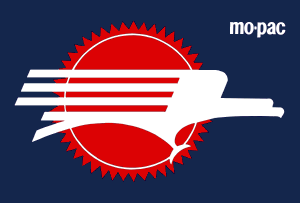 The Missouri Pacific Railroad (reporting mark MP), commonly abbreviated MoPac, with nickname of The Mop, was one of the first railroads in the United States west of the Mississippi River. MoPac was a Class I railroad growing from dozens of predecessors and mergers, including the St. Louis, Iron Mountain and Southern Railway (SLIMS), Texas and Pacific Railway (TP), Chicago and Eastern Illinois Railroad (C&EI), St. Louis, Brownsville and Mexico Railway (SLBM), Kansas, Oklahoma and Gulf Railway (KO&G), Midland Valley Railroad (MV), San Antonio, Uvalde and Gulf Railroad (SAU&G), Gulf Coast Lines (GC), International-Great Northern Railroad (IGN), New Orleans, Texas and Mexico Railway (NOTM), Missouri-Illinois Railroad (MI), as well as the small Central Branch Railway (an early predecessor of MP in Kansas and south central Nebraska), and joint ventures such as the Alton and Southern Railroad (AS).
The Missouri Pacific Railroad (reporting mark MP), commonly abbreviated MoPac, with nickname of The Mop, was one of the first railroads in the United States west of the Mississippi River. MoPac was a Class I railroad growing from dozens of predecessors and mergers, including the St. Louis, Iron Mountain and Southern Railway (SLIMS), Texas and Pacific Railway (TP), Chicago and Eastern Illinois Railroad (C&EI), St. Louis, Brownsville and Mexico Railway (SLBM), Kansas, Oklahoma and Gulf Railway (KO&G), Midland Valley Railroad (MV), San Antonio, Uvalde and Gulf Railroad (SAU&G), Gulf Coast Lines (GC), International-Great Northern Railroad (IGN), New Orleans, Texas and Mexico Railway (NOTM), Missouri-Illinois Railroad (MI), as well as the small Central Branch Railway (an early predecessor of MP in Kansas and south central Nebraska), and joint ventures such as the Alton and Southern Railroad (AS).
In 1967, the railroad operated 9,041 miles of road and 13,318 miles of track, not including DK&S, NO&LC, T&P and its subsidiaries, C&EI and Missouri-Illinois.
On January 8, 1980, the Union Pacific Railroad agreed to buy the Missouri Pacific Railroad. Lawsuits filed by competing railroads delayed approval of the merger until September 13, 1982. After the Supreme Court denied a trial to the Southern Pacific, the merger took effect on December 22, 1982. However, due to outstanding bonds of the Missouri Pacific, the merger with Union Pacific become official only on January 1, 1997.
Read more on Wikipedia.

In 1967, the railroad operated 9,041 miles of road and 13,318 miles of track, not including DK&S, NO&LC, T&P and its subsidiaries, C&EI and Missouri-Illinois.
On January 8, 1980, the Union Pacific Railroad agreed to buy the Missouri Pacific Railroad. Lawsuits filed by competing railroads delayed approval of the merger until September 13, 1982. After the Supreme Court denied a trial to the Southern Pacific, the merger took effect on December 22, 1982. However, due to outstanding bonds of the Missouri Pacific, the merger with Union Pacific become official only on January 1, 1997.
Read more on Wikipedia.
Brand/Importer Information: Bachmann Industries (Bachmann Brothers, Inc.) is a Bermuda registered Chinese owned company, globally headquartered in Hong Kong; specializing in model railroading.
Founded in Philadelphia, Pennsylvania, the home of its North American headquarters, Bachmann is today part of the Kader group, who model products are made at a Chinese Government joint-venture plant in Dongguan, China. Bachmann's brand is the largest seller, in terms of volume, of model trains in the world. Bachmann primarily specializes in entry level train sets, and premium offerings in many scales. The Spectrum line is the high quality, model railroad product line, offered in N, HO, Large Scale, On30, and Williams O gauge all aimed for the hobbyist market. Bachmann is the producer of the famous railroad village product line known as "Plasticville." The turnover for Bachmann model trains for the year ended 31 December 2006 was approximately $46.87 million, a slight increase of 3.36% as compared to 2005.
Founded in Philadelphia, Pennsylvania, the home of its North American headquarters, Bachmann is today part of the Kader group, who model products are made at a Chinese Government joint-venture plant in Dongguan, China. Bachmann's brand is the largest seller, in terms of volume, of model trains in the world. Bachmann primarily specializes in entry level train sets, and premium offerings in many scales. The Spectrum line is the high quality, model railroad product line, offered in N, HO, Large Scale, On30, and Williams O gauge all aimed for the hobbyist market. Bachmann is the producer of the famous railroad village product line known as "Plasticville." The turnover for Bachmann model trains for the year ended 31 December 2006 was approximately $46.87 million, a slight increase of 3.36% as compared to 2005.
Item created by: CNW400 on 2019-02-11 16:09:17. Last edited by CNW400 on 2023-03-10 10:14:42
If you see errors or missing data in this entry, please feel free to log in and edit it. Anyone with a Gmail account can log in instantly.
If you see errors or missing data in this entry, please feel free to log in and edit it. Anyone with a Gmail account can log in instantly.


